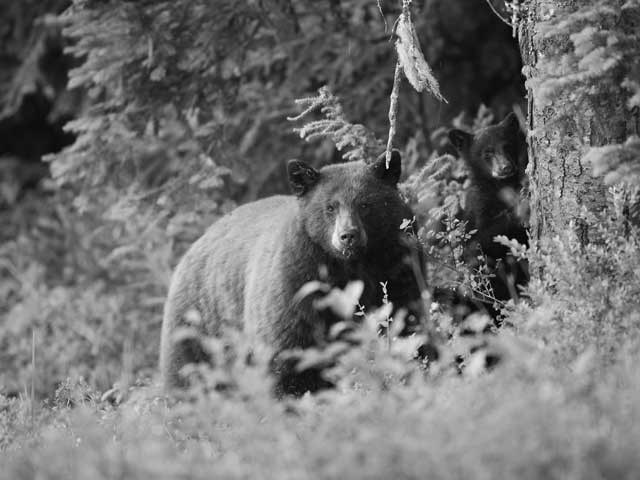As the mating period comes to an end (late May to late July), bears become focused on heavier feeding each day to begin building their fat stores for winter hibernation.
Peak grazing (mid-May to early July) is ending as bears shift to consume protein and opportunistic ripening honeysuckle, blueberry, and huckleberries. While bears will consume carrion (dead animals), they are not hunters in Whistler. Their protein sources are carpenter ants and bees. Bears tear into rotten tree stumps and logs and overturn rocks and logs to lick up concentrations of larva. Honeycomb, larva, and the bees themselves are consumed at subterranean nests between roots and in stumps.
Resident bears in the ski area are following the progression of green-up to higher elevations (> 1200-m) and sub-adult ( < 4 years old) bears are pushed to marginal habitats at the upper limit (> 1500-m) and lower limit (1000-m to valley) of Whistler and Blackcomb Mountains.
Dominant resident bears always secure the most concentrated food sources each season. The July Vaccinium (blueberry/huckleberry) berry crop at valley bottom is up to two weeks late (earliest ripening is late June to early July) in some berry plots, offering only initial scattered ripening during mid-July.
Berry ripening and plant development is unbalanced throughout berry patches from the unusually cold spring. July’s dry, warm weather will help to ripen more berries but continued heat with no rain will cause plants to stress, shrinking the berry crop. Too much of either — rain or sun — can limit berries for bears and thus, weight gain for winter and successful reproduction.
My work with bears focuses on photo-identification and monitoring of the ski area population and surrounding resident female bears. In the spring count (May-June), 61 bears were identified in the Whistler-Blackcomb ski area. Of the 17 adult females resident to the ski area, 15 are breeding and two have had two- and one-cub litters.
For the first time since 1996, no cubs were found from resident mothers on Blackcomb and the north side of Whistler Mountain sub-populations, which means at least 11 adult females from these sub-populations are exhibiting reproductive synchrony — all breeding in 2008. If this fall’s berry crop is productive (from August through early October), expect high cub production in January 2009.
The result of high cub production may cause an increase in male aggression toward mothers with COY (cubs-of-the-year) in spring 2009 as only (at least) two adult females will be scheduled to breed next year. Mothers with newborn cubs do not mate in their first spring.
Also, expect high bear activity in the valley, especially along the Valley Trail, parks, and backyards as berries continue to ripen and (at least) 18 sub-adult bears enter the valley to avoid dominant bears in high quality habitats (ski area and surrounding mid-mountain slopes) and search for easier high-calorie human foods. Bears continue to enter Whistler Village and steadily access human food from improperly maintained and now, non-bear proof sidewalk containers.
At 9 p.m. on Saturday, July 26 at Lost lake Park, I will be presenting Mother Matters: berries and bear behavior . This free, 60-minute power-point presentation sponsored by Whistler Museum and Archives Society will showcase our resident female bears on a large 50 foot high screen. The last two years (2006-2008) has seen some dramatic changes in female bear behaviour influenced from changing climate, food supply, male bear behavior, and human behavior. Status and case histories of our resident mother bears will be discussed.
Thanks to Whistler-Blackcomb for continued support of the bear viewing/monitoring program and Pique Newsmagazine’s outreach support.




